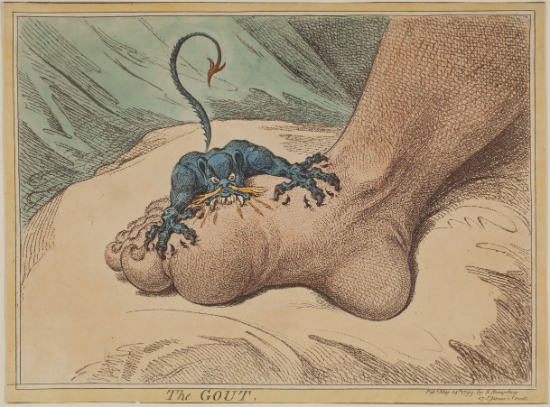 The Gout by James Gillray
The Gout by James Gillray
Thanksgiving dinner and holiday office parties are right around the corner. 'Tis the season to beware the dreaded gout! New Yorkers are more likely to eat and drink alcohol in excess during the upcoming holiday season. Next thing you know your knee, ankle, or big toe starts throbbing in the middle of the night. The bed sheets touching the top of your foot feels like a hot prod. You get out of bed and your foot is red, hot, swollen and you can't place any weight on it. Sound familiar? Gout has been well-documented throughout history, as Benjamin Franklin was one of the first to lament and write about the unbearable pain. It is often referred to as the "disease of kings" but women around the menopause years may also be afflicted.
According to Dr. Allan Gibofsky, a rheumatologist and professor of medicine at Weill Cornell Medical Center in New York City, "Gout is found exclusively in humans and is characterized by an elevation in uric acid, known as hyperuricemia. It is a metabolic problem resulting in either overproduction of uric acid or reduced removal of uric acid from the blood."
Gout is characterized by recurrent attacks of arthritis usually occurring between the fourth and sixth decades of life and is rare to non-existent in the childhood and teenage years. Most acute attacks occur prior to age 50 in males. In the U.S. there are an estimated 2.2 million cases of patient-reported gout each year and approximately 37 million working days are lost each year to gout attacks.
"In 85 to 90 percent of first attacks, a single joint is usually involved, with the big toe being the most commonly affected site," remarks Dr. Gibofsky. In general, there is little change in their blood uric acid concentrations in females until menopause, when the concentrations increase to values found in adult men. It is primarily a disease of the legs occurring most often in the ankles, heels and knees but can also affect the wrists, fingers and elbows. "Hyperuricemia has been reported in 2-18 percent of the population, and there is a strong correlation with body weight, height, age, blood pressure and alcohol intake," adds Gibofsky.
Hyperuricemia initially does not present with symptoms. This asymptomatic phase ends with the first attack of gouty arthritis. The first gouty attack usually occurs at least 20 years after a sustained period of hyperuricemia.
"Gout has been associated with many medical conditions. Obesity, diabetes, high blood pressure, hypothyroidism, and dehydration, just to name a few," explains Dr. Gibofsky. Medications that people commonly take can also precipitate an attack of gout. For example, low dose aspirin therapy used to address heart attack prevention and water pills such as hydrochlorothiazide have also been known to trigger a gouty attack. Environmental factors such as stress, unusual physical activity, trauma to a joint, weight loss and even a hospital stay are also recognized precipitators of a gouty attack as well as stomach disorders such as diarrhea.
People who suffer from gout should watch their diet and avoid certain foods known to be rich in specific proteins known as purines. Foods such as anchovies, sardines, red meat, liver, cheese, gravies, mushrooms, lentils, shellfish, turkey, and tomatoes are known to trigger a gout attack. Any of these foods consumed with alcohol raises the risk of attack.
Treatment varies according to the individual patient. There are medications that a doctor may prescribe to control the removal of uric acid concentrations from the blood. Other medications, such as anti-inflammatories, can help the symptoms of an acute attack but are only temporary means of dealing with the painful episodes. "If you have gout, or if anyone in your family has gout you should see a physician," remarks Dr. Gibofsky. He further adds, "preferably a rheumatologist who specializes in the treatment of arthritis."